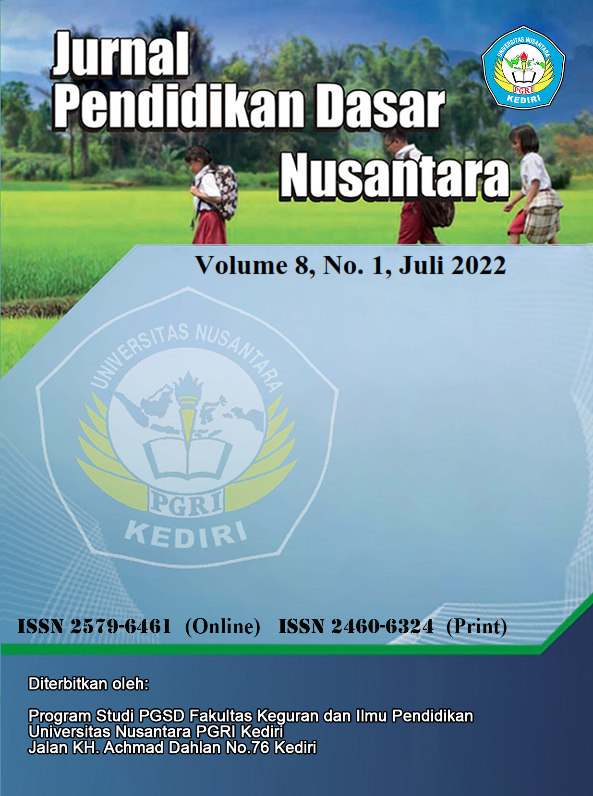ANALYSIS OF INFORMATION PROCESSING CAPABILITIES AND DIGITAL DATA ON DIGITAL LITERACY SKILLS OF ELEMENTARY SCHOOL STUDENTS
DOI:
https://doi.org/10.29407/jpdn.v8i1.18278Keywords:
Digital Literacy; Information Processing and Digital Data; Digital TechnologyAbstract
Digital technology in the 21st century is growing rapidly, especially at the elementary school level. But in reality some students have not been able to adapt to technology and minimal digital literacy skills. As a result, students have difficulty in choosing valid information on digital media. Therefore, students must have digital information and data processing skills. These skills are needed to filter information and data obtained using digital technology in order to be able to analyze information from digital sources accurately and can be justified. This study aims to determine the level of digital data and information processing ability in digital literacy skills of elementary school students. This study uses a descriptive quantitative approach with a survey method, with data collection through questionnaires and online case study test questions to a sample of 151 high school elementary school students. The data analysis technique used in this research is descriptive statistical technique. The results of this study indicate that the ability to process information and digital data on digital literacy skills of students from 4 elementary schools in East Java is still in the sufficient category, so it still needs to be improved.
Downloads
References
Ahman, Mujiyanto, J., Bharati, Dwi Anggani Linggarnggeraini, Y., & Faridi, A. (2019). Literasi digital: Dampak dan tantangan dalam pembelajaran bahasa. Seminar Nasional Pascasarjana UNNES, 386–389. https://proceeding.unnes.ac.id/index.php/snpasca/article/download/313/342/
Fauziah, A. A. (2018). Hubungan antara budaya sekolah dengan mutu sekolah di SMA Muhammadiyah 18 Sunggal. 2015, 1–30.
Fred Rogers Center. (2012). Technology and Interactive Media as Tools in Early Childhood Programs Serving Children from Birth through Age 8. Children, January, 1–15. http://www.naeyc.org/positionstatements
Hanik, E. U. (2020). Self Directed Learning Berbasis Literasi Digital Pada Masa Pandemi Covid-19 Di Madrasah Ibtidaiyah. Elementary Islamic Teacher Journal, 8(1), 183–208.
Ilham, M., & Marlini, M. (2019). Pembuatan Komik Literasi Informasi Untuk Meningkatkan Literasi Siswa di Perpustakaan SMA Negeri 1 Padang. Ilmu Informasi Perpustakaan Dan Kearsipan, 8(1), 204. https://doi.org/10.24036/107327-0934
Islamy, I. (2019). Penelitian Survei dalam Pembelajaran & Pengajaran Bahasa Inggris. Pasca Sarjana Pendidikan Bahasa Inggris, August, 1–9. https://www.researchgate.net/publication/335223420_Penelitian_Survei_dalam_Pembelajaran_Pengajaran_Bahasa_Inggris
Jones, R. ., & Hafner, C. . (2021). Understanding Digital Literacies : A Practical Introduction (2nd Editio). Routledge. https://doi.org/https://doi.org/10.4324/9781003177647
Kemendikbud, K. P. dan K. R. I. (2017). Materi Pendukung Literasi Digital. Tim GLN Kemendikbud.
Kharisma, H. V. (2016). Literasi Digital di Kalangan Guru SMA di Kota Surabaya. Ocean Modelling, 22(3), 1361–1369. http://dx.doi.org/10.1016/j.ocemod.2013.04.010%0Ahttp://dx.doi.org/10.1016/j.ocemod.2011.06.003%0Ahttp://dx.doi.org/10.1016/j.ocemod.2008.12.004%0Ahttp://dx.doi.org/10.1016/j.ocemod.2014.08.008%0Ahttp://dx.doi.org/10.1016/j.jcp.2009.08.006%0Ahttp://dx.doi
Kurniawan, M. R., & Pambudi, D. I. (2018). Literasi Dalam Pembelajaran di Sekolah Dasar (Pentingnya Pendidikan Karakter Bagi Generasi Digital Native). Seminar Nasional Pendidikan Dasar, 386–393.
Law, N., Woo, D., de la Torre, J., & Wong, G. (2018). A Global Framework of Reference on Digital Literacy Skills for Indicator 4.4.2. UNESCO Institute for Statistics, 51, 146.
Marty, P. F., Alemanne, N. D., Mendenhall, A., Southerland, S. A., Sampson, V., Douglas, I., Kazmer, M. M., Clark, A., & Schellinger, J. (2013). Scientific inquiry , digital literacy , and mobile computing in informal learning environments. February 2015, 37–41. https://doi.org/10.1080/17439884.2013.783596
Maulana, M. (2015). Definisi , Manfaat dan Elemen Penting Literasi Digital. 1(2), 1–12. https://www.muradmaulana.com/2015/12/definisi-manfaat-dan-elemen-penting-literasi-digital.html
Riski, Ligia, Winoto, Yunus, Rohman, S., & Asep. (2018). BIBLIOTIKA : Jurnal Kajian Perpustakaan dan Informasi LITERASI INFORMASI SISWA SEKOLAH MENENGAH PERTAMA DALAM PENGERJAAN TUGAS SEKOLAH. 2, 132–140.
Setiansah, M., Novianti, W., & Istiyanto, S. B. (2019). Literasi Media Digital Berbasis Individual Competence Framework Pada Keluarga Buruh Migran Anggota Paguyuban Seruni Kabupaten Banyumas. Journal Acta Diurna, 15(1), 17. https://doi.org/10.20884/1.actadiurna.2019.15.1.1572
Silvana, H., & Darmawan, C. (2018). Pendidikan Literasi Digital Di Kalangan Usia Muda Di Kota Bandung. Pedagogia, 16(2), 146. https://doi.org/10.17509/pdgia.v16i2.11327
Sugiyono. (2013). Metode Penelitian Kuantitatif Kualitatif dan R&D (19th ed.). ALFABETA.
Sulianta, F. (2019). Literasi Digital, Riset, Perkembangannya & Perspektif Social Studies.
Sumiaty, N., & Sumiaty, N. (2014). Literasi Internet pada Siswa Sekolah Menengah Pertama. Jurnal Penelitian Komunikasi, 17(1), 77–88. https://doi.org/10.20422/jpk.v17i1.8
Syah, M., Rosdakarya, R., Sumantri, M., & Didik, P. P. (2013). Teori Perkembangan Kogitif Jean Piaget. 6(1), 89–99.
Tuan Soh, T. M., Arsada, N. M., & Osman, K. (2010). The relationship of 21st century skills on students’ attitude and perception towards physics. Procedia - Social and Behavioral Sciences, 7(C), 546–554. https://doi.org/10.1016/j.sbspro.2010.10.073
Ulum, B., Fantiro, F. A., & Rifa’i, M. N. (2019). Pemanfaatan Google Apps di Era Literasi Digital Pada Siswa Sekolah Dasar. Lentera: Jurnal Pendidikan, 14(2), 22–31. https://doi.org/10.33654/jpl.v14i2.843
Downloads
Published
Issue
Section
License
Authors who publish with this journal agree to the following terms:
- Copyright on any article is retained by the author(s).
- The author grants the journal, the right of first publication with the work simultaneously licensed under a Creative Commons Attribution License that allows others to share the work with an acknowledgment of the work’s authorship and initial publication in this journal.
- Authors are able to enter into separate, additional contractual arrangements for the non-exclusive distribution of the journal’s published version of the work (e.g., post it to an institutional repository or publish it in a book), with an acknowledgment of its initial publication in this journal.
- Authors are permitted and encouraged to post their work online (e.g., in institutional repositories or on their website) prior to and during the submission process, as it can lead to productive exchanges, as well as earlier and greater citation of published work.
- The article and any associated published material is distributed under the Creative Commons Attribution-ShareAlike 4.0 International License

































